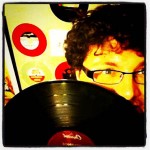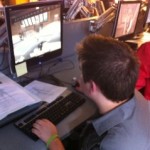I’ve got a super-busy schedule these days; my writing gigs have increased exponentially, I’m enrolled in the Recording Arts program at Tribeca Flashpoint Media Academy here in Chicago, and I’m working the post-production end of my short film, 45 RPM.
So naturally, I have absolutely no time whatsoever to consider the gig that was offered to me today via e-mail; a digital managing editor slot for a startup near me.
I didn’t apply for this gig–far from it–it came to me in my inbox today from a creative placement agency. I didn’t have to wonder how they found me, as I’ve got a little strategy to help me track where my random e-mails come from and how I’ve been discovered on the Internet.
My resume site for my work in multi-media has a site-specific e-mail address. So does my writing-specific resume site. Ditto for my vinyl blog Turntabling.net and my filmmaking blog Now-Sound.com.
The headhunter found me, oddly enough, via my multimedia resume page. So it’s likely the headhunter did a keyword search for a set of specific terms and my site wound up in the page one or page two results.
If you want to be discovered this way, there are plenty of ways to do it–mine includes having a resume page that’s been online at the same address for a very long time, using SEO-optimized resume writing techniques, along with plenty of images also with SEO optimized filenames. But none of this is my point, really.
If you really want to open up some additional freelance options for yourself, I strongly suggest you check out the creative temp agencies in your market. They can be an important source of income for a creative freelancer. Some of my highest profile and best-paying work has come from agencies, and I did some good work for these household name-type companies.
If you’re frustrated with a lack of work, a creative temp agency might just open up some new income potential for you. I have no time whatsoever to consider the position e-mailed to me today, but maybe YOU do.
Joe Wallace is a writer, editor, indie filmmaker, multi-media artist and time management fanatic. He has many projects going at once, and has finally realized he’s not truly happy unless he’s beating deadlines, rushing for trains, calculating the amount of remaining natural light, editing video, and planning his next recording session all within the same day. He blogs about filmmaking at Now-Sound.com.


 Your dream is about writing. I already know that. But what I want to know is if you’re living your big writing dream today?
Your dream is about writing. I already know that. But what I want to know is if you’re living your big writing dream today? 


